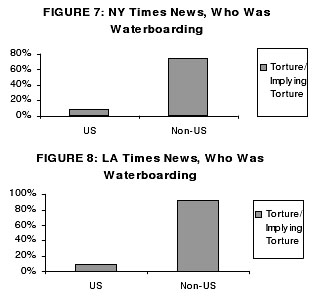 Via Andrew Sullivan, a new study from the Joan Shorenstein Center finds that major U.S. newspapers routinely referred to waterboarding as torture until 2002, when they suddenly stopped. Unsurprisingly, the U.S. media’s attitude toward waterboarding depended almost entirely on who was doing it:
Via Andrew Sullivan, a new study from the Joan Shorenstein Center finds that major U.S. newspapers routinely referred to waterboarding as torture until 2002, when they suddenly stopped. Unsurprisingly, the U.S. media’s attitude toward waterboarding depended almost entirely on who was doing it:
News articles that considered other countries or individuals committing waterboarding were far more likely to classify waterboarding as torture than articles that dealt with the U.S. using waterboarding.
In the NY Times, 85.8% of articles (28 of 33) that dealt with a country other than the U.S. using waterboarding against an individual called waterboarding torture or implied it was torture. Yet when the U.S. was the perpetrator, only 7.69% (16 of 208) articles said or implied that waterboarding was torture. Just 0.8% of the articles (1 of 133) dealing with the War on Terror where the U.S. was the perpetrator said or implied that waterboarding was torture.
The LA Times follows a similar pattern of avoiding the label of torture when the U.S. is responsible for using waterboarding. In articles that considered other countries using waterboarding, 91.3% of articles (21 of 23) called waterboarding torture or implied the practice was torture. When the U.S. was the violator, only 11.4% of articles (9 of 79) used this classification.
As always, where you stand depends on where you sit.


















